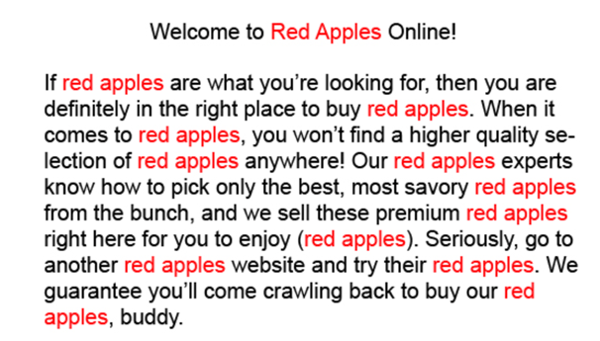SEO has evolved a lot over the years as positioning algorithms have changed. This means that techniques that were used years ago, such as keyword stuffing, no longer work. Learn what keyword stuffing is and how to avoid it.
What Is Keyword Stuffing?
Keyword stuffing consists of including keywords repeatedly on a website in an attempt to rank in Google results. This sacrifices the naturalness of an article.
The keywords appear many times in different places on the page. While it is true that keywords are important to position a web page, Google has detected that using the same keyword too many times negatively affects the user experience. That is why it developed Google Panda, a tool that penalizes pages that do this in an effort to rank high-quality results higher in SERPs.

How Can You Avoid Keyword Stuffing?
In order to avoid keyword stuffing, you must be clear about what Google considers the same keyword and what it doesn't.
Plurals and singulars are considered the same keyword, as well as words with the same root. Therefore, the words "book flights" "book flight" and "book flights" would be considered the same keyword.
There are different tools that allow you to measure the keyword density of a text, such as Keyword Analyzer or Submit Express. There is no magic density that works for every case, but in general, a best practice is to keep the keyword density less than 3%.
Use your keywords strategically. For example, you can highlight the primary keywords in bold and include them in landing pages, H1s and H2s, URLs, and alt text fields.
Keep in mind that Google's algorithms are getting better at Natural Language Processing (NLP), so don't be afraid to use synonyms and related terms, even if they don't literally correspond to the keyword you want to rank for.
Above all, remember that the most important thing is to create a good user experience. If you create quality content and take care of the most important aspects of web usability, including navigation structure and loading times, you don't have to obsess about keyword density.
Responsable de la estrategia de contenidos y visibilidad en Cyberclick, con enfoque Allbound y especialización en posicionamiento SEO, GEO y automatización con IA. Gestión avanzada del CRM con HubSpot: base de datos, workflows, lead nurturing, scoring y reporting. Experiencia en marketing digital, comunicación corporativa y periodismo, uniendo estrategia, creatividad y tecnología para captar y convertir leads cualificados.
Responsible for content and brand visibility strategy at Cyberclick, with an Allbound approach and specialization in SEO, GEO (Generative Engine Optimization), and AI-powered automation. Advanced HubSpot CRM management: database segmentation, workflows, lead nurturing, scoring, and reporting. Background in digital marketing, corporate communications, and journalism—combining strategy, creativity, and technology to attract and convert qualified leads.

.jpg?width=800&name=What%20Is%20Keyword%20Stuffing%20and%20How%20Can%20You%20Avoid%20It%20(1).jpg)





Leave your comment and join the conversation